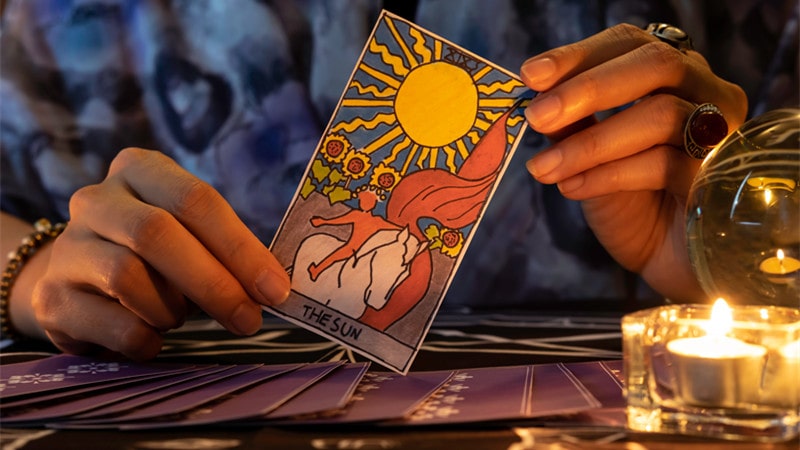In spiritual guidance and communication with the unseen, psychics and mediums are often mentioned interchangeably.
However, they possess distinct abilities and serve different purposes in connecting with the spiritual realm. In this article, we’ll delve into the differences between psychics and mediums, exploring their unique gifts and how they contribute to spiritual practice.
Psychics: Tapping into Intuition and Extrasensory Perception
Psychics are individuals who possess heightened intuition and extrasensory perception, allowing them to perceive information beyond the ordinary senses. They may receive insights, impressions, or visions about past, present, or future events through various methods such as clairvoyance (seeing), clairsentience (feeling), or clairaudience (hearing). Psychics often use divination tools like tarot cards, crystal balls, or astrology charts to help interpret the information they receive.
One of the key aspects of psychic ability is the ability to tune into the energy fields or vibrations surrounding people, objects, or situations. Psychics may provide guidance, insights, or predictions based on this intuitive understanding of energy patterns and dynamics. While not all psychics claim to have predictive abilities, many offer guidance and support in navigating life’s challenges and uncertainties.
Mediums: Facilitating Communication with Spirits
Mediums, on the other hand, are individuals who possess the ability to communicate with spirits or entities from the spiritual realm. They act as intermediaries between the physical world and the spirit world, relaying messages, insights, or evidence of the afterlife from deceased loved ones, spirit guides, or other entities. Mediumship can take various forms, including mental mediumship (communication through thoughts or mental impressions) or physical mediumship (manifestation of physical phenomena).
Mediums often use their psychic abilities to establish a connection with the spirit world, tuning into the energy and vibrations of spirits to receive messages or information. They may communicate with spirits through mental imagery, auditory messages, or physical sensations, relaying these messages to their clients with compassion and empathy. Mediumship sessions can provide comfort, closure, and validation for those seeking to connect with departed loved ones or receive guidance from the spiritual realm.
Ethical Considerations in Spiritual Practice
In the realm of spiritual guidance and communication, ethical considerations play a crucial role in maintaining integrity and trust between practitioners and clients. It’s essential for practitioners to adhere to ethical guidelines and standards to ensure that their work is conducted ethically and responsibly. One key ethical consideration is respecting client confidentiality and privacy. Practitioners must uphold the confidentiality of client information and refrain from disclosing sensitive personal details without consent.
Another important ethical consideration is providing accurate and honest information to clients. Practitioners should refrain from making false claims or promises and avoid using fear tactics or manipulation to coerce clients into seeking additional services. Honesty and transparency are essential in fostering trust and credibility within the spiritual community.
Additionally, practitioners should maintain professional boundaries and avoid engaging in inappropriate or unethical behavior with clients. This includes refraining from engaging in romantic or sexual relationships with clients, as well as avoiding any actions or behaviors that could be perceived as exploiting the client-practitioner relationship for personal gain.
By adhering to ethical guidelines and standards, practitioners can uphold the integrity of their work and foster positive relationships with clients built on trust, respect, and mutual understanding. It’s important for clients to be aware of their rights and expectations when seeking spiritual guidance and to choose practitioners who demonstrate a commitment to ethical practice.
Developing and Honing Spiritual Gifts
For individuals interested in exploring their own spiritual gifts and abilities, it’s essential to dedicate time and effort to develop and hone these skills. Spiritual gifts, such as intuition, empathy, and extrasensory perception, can be cultivated and strengthened through various practices and exercises. Meditation, mindfulness, and energy work can help individuals connect with their inner guidance and tap into their intuitive abilities.
Practicing self-reflection and journaling can also be helpful in developing spiritual gifts, as it allows individuals to become more aware of their thoughts, feelings, and intuitive impressions. Engaging in activities that nourish the soul, such as spending time in nature, practicing creative expression, or connecting with like-minded individuals, can also support the development of spiritual gifts.
It’s important for individuals to trust their intuition and inner guidance as they explore and develop their spiritual gifts. Learning to discern between intuitive insights and ego-driven thoughts is key to honing one’s spiritual abilities and using them for the highest good. Seeking guidance from experienced mentors or teachers can also provide valuable support and guidance on the journey of spiritual development.
Integrating Spirituality into Everyday Life
Spirituality is not just about seeking guidance or connecting with the divine; it’s also about integrating spiritual principles and practices into everyday life. Incorporating spirituality into daily routines and activities can help individuals cultivate a deeper sense of meaning, purpose, and connection.
One way to integrate spirituality into everyday life is through mindfulness practices such as meditation, prayer, or conscious breathing. Taking time each day to quiet the mind, connect with the present moment, and cultivate inner peace can help individuals stay grounded and centered amidst the challenges and stresses of daily life.
Another way to integrate spirituality into everyday life is by practicing gratitude and appreciation for the blessings and abundance present in each moment. Cultivating a mindset of gratitude can help shift focus away from negativity and scarcity towards positivity and abundance, leading to greater overall well-being and fulfillment.
Finding ways to serve others and contribute to the greater good can also be a powerful way to integrate spirituality into everyday life. Acts of kindness, compassion, and generosity benefit others and nourish the soul and deepen one’s sense of connection to the world around them.
By integrating spirituality into everyday life, individuals can cultivate a deeper sense of meaning, purpose, and connection, leading to greater overall well-being and fulfillment. Whether through mindfulness practices, acts of service, or cultivating gratitude, there are countless ways to infuse daily life with spiritual awareness and presence.
The Distinction: Psychic Abilities vs. Mediumship
While both psychics and mediums possess intuitive abilities and extrasensory perception, the key distinction lies in their focus and expertise. Psychics primarily focus on tapping into intuitive insights and energy patterns to provide guidance and predictions about various aspects of life. Based on their intuitive understanding of energy dynamics, they may offer insights into relationships, career paths, or personal development.
Mediums, however, facilitate communication with spirits and entities from the spirit world. Their primary focus is connecting clients with departed loved ones, spirit guides, or other spiritual beings to relay messages, provide validation, or offer guidance from the other side. While some mediums may possess psychic abilities, not all psychics can communicate with spirits, making mediumship a distinct and specialized gift within spiritual practice.
In conclusion, psychics and mediums possess distinct gifts and serve different spiritual guidance and communication roles.
Psychics rely on intuition and extrasensory perception to provide insights and guidance about various aspects of life, while mediums facilitate communication with spirits and entities from the spirit world. For the best people in this industry, the list provided by SacBee is something you can’t go wrong with.
Understanding the differences between psychics and mediums can help individuals seeking spiritual guidance choose the right practitioner to meet their needs and goals. Whether seeking intuitive insights or messages from the other side, both psychics and mediums offer valuable support and guidance on spiritual growth and self-discovery.




